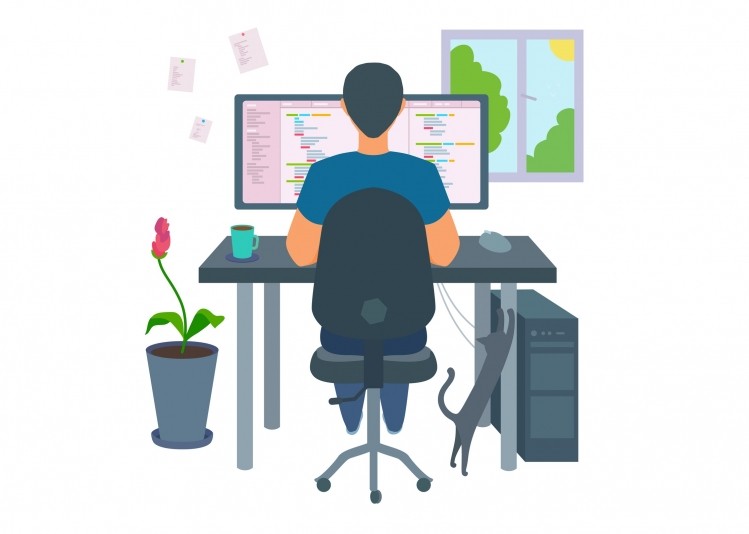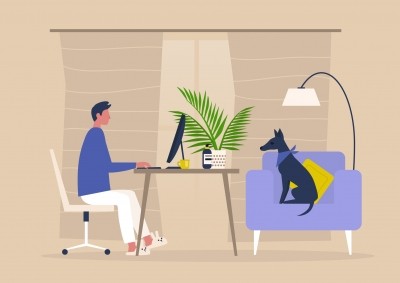Coronavirus: How has it changed your job in the beverage industry?

Tony Battaglene, Chief Executive, Australian Grape & Wine
BD: It’s harvest season for Australia’s wine industry. How have you had to adjust – and how can you continue to support the industry during this period?
TB: At Australian Grape & Wine, we have all been working from home for two weeks now. Our organisation has always had a flexible working arrangement for most staff, so we have adapted well. At the moment we are trying to keep providing accurate information out to the grape and wine sector and advocate with government for more assistance when needed.
We still have a few weeks of vintage left, so we are trying to maintain the wine sector as an operating business in the face of an increasing number of shutdowns. Health and safety is of course paramount, but we have one shot at vintage and are looking to produce what appears to be a smaller then average but stunning quality of fruit in most of Australia.
In Australia, the Federal Minister for Agriculture, Drought and Emergency Management David Littleproud has said he supports the wine industry as an essential service, which is gratifying. However, we must continue to push for freight, labour movements, bottling and packaging and export services to remain operating throughout any lock downs or state border closures.
BD: How has your average working day changed?
TB: All meetings are now remote. I wish I had bought shares in Zoom. It is amazing how many different platforms there are out there. Lunch out of home is a thing of the past, so a sandwich is the healthy alternative. I also try and get out for a run to get some exercise (while social distancing of course).
BD: Your take on home working?
TB: I am finding home working fairly productive. I prefer an office, as I like to separate work from home, but not commuting means a more productive day.
Steve Norris, co-founder, GetMoreVits
BD: What’s been the impact of coronavirus on your beverage brand?
SN: In many ways we are fortunate at Get More Vits, since our range of sugar-free drinks give consumers easy and tasty ways to keep their vitamin levels topped up and stay healthy. Additionally we have a presence within Grocery, so sales of our Take Home products have held up reasonably well.
Our on-the-go business has inevitably suffered – this includes all of our Foodservice trade and also Lunchtime ‘Meal Deal’ trade within Convenience – so we have switched our focus to online to adapt to customer’s new shopping habits. We have seen a 4-5 fold increase in our Amazon business and are ensuring our social media presence is as up-to-date, relevant and engaging as it can be.
BD: How has your average working day changed?
SN: Get More Vits has always been a remote, virtual business driven by our desire to minimise overheads and to have a flexible approach to recruitment to enable us to assemble the best team.
What has changed is that normally most of the team work from home 2-3 days per week and this has now risen to 5 days a week! With us all in some form of isolation now, regular, visual contact with the team is all the more important (to help keep us sane if nothing else!) so we have a whole-team Zoom every couple of days. Last week we had our first Friday after work e-drinks, where the team could ‘bring’ a drink with them. The beauty of this of course was no-one had to drive!
'Regular visual contact with the team is important - to keep us sane if nothing else!'
BD: You’ve been working from home for around 20 years. Top tips?
SN: It’s important to have a set of rules to abide by and these are the ones that have worked for me:
- Wherever possible it is important to have a dedicated room or space in your home where you work from. Otherwise there is a risk of the boundaries being blurred.
- Conversely it is equally important to make good use of the flexibility of working from home. This might contradict the above, but a conscious and deliberate blurring of boundaries can be positive to enable a dynamic work/life balance. It might work better for example to take some time out during the day for personal reasons – running an errand or going to the gym - and then be at the computer during the evening or weekend if it's a more productive time.
- Communicate your planned working from home schedule with your colleagues so they always know when you are available. It will help you all work more effectively as an individual and as a team.
- Write a (realistic) to-do list for the day...and complete it. There are always distractions that get in the way of a day’s work, be that at home or in the office – so it’s not always feasible to do everything you set out to do. But have a plan for the day and where possible aim to achieve it.
Richard Hall, chairman, Zenith Global
BD: Is it ‘business as usual’ - or have you had to adapt and change what you do?
RH: Half is business as usual, half is quite different. Our role as consultants is always to improvise and anticipate. We can still research, analyse and advise. But global knowledge requires global vision and we can’t travel, so work on the ground is restricted. Some events have been postponed, but everyone is making extra effort to preserve what’s good and develop new ways of improving future prospects. We’re all facing the same unnerving threat together.
BD: How has your average working day changed?
RH: We now have more than 2 weeks’ experience of how technology can overcome most barriers to planning and communication. It’s by no means as good as the informality and flow of office interaction, but all contacts are more structured and discussions more to the point. Personally, I now have a proper family lunch rather than a sandwich at the desk. I go outdoors in the late afternoon and catch up on work in the evening. So there are gains amidst the concerns.
BD: How are you finding home working?
RH: I think we shall return to a world that has changed. There will be more flexible hours and offices will no longer be the default setting in the same way. Lockdown technology use will show us new ways to communicate socially and to shop more effectively. Above all, I hope there will be more humanisation of business and localisation of production. In the end, after much sacrifice, I believe we shall end up a less selfish, less excessive and more caring world.
Hannah Krum, founder and president, Kombucha Brewers International
BD: Is it ‘business as usual’ - or have you had to adapt and change your role and what you do?
HK: It remains business as usual at Kombucha Brewers International. When we first started, I worked as a volunteer which meant we had to be thrifty and nimble and fortunately, that means we have always been a virtual business.
However, we have had to pivot some important initiatives and events including KombuchaKon tradeshow and conference. The annual event was planned for April 1-3, 2020 in Long Beach, but regrettably, yet understandably, we've had to cancel.
Since this is one of my many hats, our other business, Kombucha Kamp has received an influx of people wanting to brew their own Kombucha at home, so I've had to rely on the virtual team to cover more than usual and add some weekend hours to continue to provide the necessary resources and support to our members. To that end, we are offering a free webinar on how our small businesses can leverage the funds provided by the Federal government.
Additionally, we are looking to add an online conference so that our members receive the education they need as well as to find new opportunities for our affiliates to connect with our producers all while launching a new publication, Symbiosis Magazine.
We also just recently hired a new assistant executive director, and while we are a virtual business, we would have typically met in person and started her onboarding process in person to get her immersed in all things Kombucha Brewers International. We also had to ask her to start in a part time capacity due to the income lost from cancelling KombuchaKon which has also stifled the onboarding process. Thankfully she's flexible and while we’re still able do everything via Zoom meetings and conference calls, we’re looking forward to connecting in person!
BD: How has your average working day changed?
'Place a decorative throw or screen around your work area. That's important for mentally letting go of the work day'
HK: My average work day has not changed so much with Kombucha Brewers International, but it certainly has with my other business, Kombucha Kamp, as we provide education and resources for homebrewers around the world.
As more people are staying home and looking for new activities to try alone or with the family, or maybe looking for ways to support their immune system, we’ve seen an increase in Kombucha Kit purchases which has been preoccupying most of my time.
It’s exciting to be sending out so many fermentation cultures and elderberry kits knowing these supplies will provide a meaningful project along with nutritional support at a time when people need a way to channel their energy.
BD: How do you feel about home working?
HK: I’ve been working from home for many years, so I enjoy it. I have a great office setup at home including dual screens and a standing desk which allows me to focus and be productive during my working hours. There are two sides of the coin in working from home - one is that you are never "away from work" and if I don't consciously schedule breaks, I wear myself out.
The other side is that I can take a break in my yard, do some gardening or bask in the sunshine with my dog which is a very nurturing way to release stress and get regrounded. I think that’s the key – have a designated space for your home office/working area to separate work and leisure. Even if it’s in your living room, placing a decorative throw or using a screen to sequester the area when the work day is done is important for mentally letting go of the work day
Dan Hooper, co-founder, YesMore marketing agency
BD: Is it ‘business as usual’ - or have you had to adapt and change what you offer?
DH: At YesMore we’re counting our blessings that we built the agency to be entirely remote and flexible working from the point we launched three years ago. Our team works from where and when they are most productive, and we provide desk space in Los Angeles and London for us to come together if and when we need to collaborate in person.
Whilst much of our London team commute into our Shoreditch office, everyone started working from home a fortnight before Boris asked the nation to self-isolate. Public transport provided an unnecessary risk, so we simply avoided it.
Meanwhile, I do the same in LA. My days often start very early, mostly because I’m an early bird, but also to maximise the time we have online together as a team. Plus the time difference means we’re available to global clients for more hours in the day.
BD: What does your average day look like now?
DH: Our working days haven’t changed massively since working from home. Everything is already stored in the cloud, our comms continue to thrive via Slack. We already have great etiquette when it comes to video conferencing. And so for us, everything has continued as it always did.
What we have done, however, is improve and increase our efforts on socialising remotely from each other. We make a conscious effort to ask about each other’s weekends and replace “how was your weekend?” with “how did you make the most of your weekend?” We’re having more virtual tea breaks, and now we also invite our external suppliers and contractors, many of whom work solo and might fancy a little break from it all by talking rubbish with our team for fifteen minutes.
'We invite external suppliers and contractors to our virtual tea breaks, many of whom work solo and might fancy a little break from it all by talking rubbish''
We initiated an ‘office’ wide video conference call with all the other businesses in our London co-working space, Protein Studios, too. We ‘meet’ with all the business owners each week to share learnings, raise concerns, provide ideas and problem solve with each other’s businesses.
My co-founder, Tom Harvey, and one of our team, Emma Hancock, both recently qualified as Mental Health First Aiders. So they’re being extra vigilant while they develop a more comprehensive way in which we as a business can look after the mental well being of our staff, suppliers and even clients.
BD: Are you a fan of working from home?
DH: I love working from home, it’s where I’m most productive and I’ve done it for three years. I love our shared workspace, but also love the option of avoiding the trudge into an office each day if I fancy my own coffee, tunes and space at home. Keeping overheads low means we can invest in other things that benefit our team more. This way of working has ensured we only hire people with the right work ethic for remote working.
I do of course recognise the drawbacks of working from home - most notably loneliness, isolation, reduced sociability, company culture. But these are all things that can be worked on if you put the effort into developing solutions to making them work. One silver lining with enforced isolation during this time is that it forces company directors to put the effort in solving these problems.
Given our experience having our teams work from their homes (in Los Angeles, New York, London, Brighton, Bristol, Glasgow, Bordeaux, Poland, Sydney and more) we’ve put together some tips for others who aren’t used to working from home.
Iain McKenna, manufacturing manager, Synergy Flavours
BD: How is the coronavirus outbreak affecting your role?
IM: I oversee the day-to-day operations of the plant, including planning schedules, accessing staffing and material resource, managing maintenance teams, contractors and production lines.
During difficult times like this, managers are required to take a leading role to ensure teams are reassured, protected, aligned and engaged.
We have implemented short and medium term measures to protect our employees and allow for the continued manufacture of quality product at our many locations. Our sole focus is on the protection of our employees, customers and communities, and playing our part to keep the global food supply chain strong and producing.
BD: How has your average working day changed?
IM: Social distancing is our highest priority. We’ve split our work force from one to two shifts 6am-2pm and 2pm-10pm and lunches are being staggered where possible. All but a few office-based staff are now working from home, so all meetings are taking place remotely from as many as 12 locations at any one time.
With some customers, we’ve seen an increase in order sizes and changes to lead times. Where possible we’ve offered flexibility to support our customers through shift patterns and extending our typical production schedules.
BD: How’s remote working affecting how you work together?
IM: Key colleagues in planning, purchasing and supply chain are well connected and are working really hard to make everything work as normally as possible. The skeleton team in the office is managing the physical tasks that must be done on site. Those at home have remote access to our ERP system and networks and we have set up new tools like “softphones.” This keeps them all on the office phone network exactly as if they were in the office so they can speak to colleagues, customers, suppliers and service providers in exactly the same way as they would if they were sat at their desks. It’s different, and without the face-to-face contact we are used to, not something I’m sure I’d want to see permanently, but it’s working.















